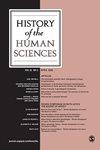I never promised you a rose garden.… When landscape architecture becomes a laboratory for the Anthropocene
IF 0.5
2区 历史学
Q2 HISTORY & PHILOSOPHY OF SCIENCE
引用次数: 0
Abstract
In the summer of 2017, wildflower seeds were spread on a large, empty open space close to a motorway flyover just outside Copenhagen, Denmark. This was an effort to use non-mechanical methods to prepare the soil for an ‘urban forest’ to be established on the site, since the flowers’ roots would penetrate the ground and enable the planned new trees to settle. As a result, the site was transformed into a gorgeous meadow, and all summer long Copenhageners were invited to come and pick the flowers. In this article, I critically examine different aspects of this project – including the role of design, the perception of nature–culture relationships, climate change, and flower-picking as an event – in relation to my personal experience of visiting this meadow both on-site and on social media. The different temporalities that clash at the site give rise to conflicting interpretations, and I suggest that the meadow can be seen as a living plant archive of the Anthropocene, both physically and digitally. In doing so, I introduce and critique key conceptual pairs, including archive/death and bloom/decay, suggested by Lee Edelman’s queer cross-reading of Jacques Derrida’s ‘Archive Fever’ and Shakespeare’s Hamlet. I thereby contrast flower motifs pertaining to the cycles of blooming, decay, and nature’s (failed) eternal return in the meadow with the expansive futurity of the digitally mediated archive.我从来没有答应过你一个玫瑰园。…当景观建筑成为人类世的实验室
2017年夏天,在丹麦哥本哈根郊外的高速公路立交桥附近,一大片空旷的空地上散布着野花种子。这是一种使用非机械方法为在基地上建立“城市森林”准备土壤的努力,因为花朵的根将穿透地面,使计划中的新树木能够定居下来。因此,这个地方变成了一片美丽的草地,整个夏天,哥本哈根人都被邀请来采摘鲜花。在这篇文章中,我批判性地审视了这个项目的不同方面——包括设计的作用、对自然-文化关系的感知、气候变化和采花作为一个事件——以及我在现场和社交媒体上访问这片草地的个人经历。不同的时间性在场地上发生冲突,产生了相互矛盾的解释,我认为这片草地可以被视为人类世的活植物档案,无论是物理上还是数字上。在此过程中,我介绍并批判了关键的概念对,包括档案/死亡和开花/腐烂,这是李·埃德尔曼(Lee Edelman)对雅克·德里达(Jacques Derrida)的《档案热》(archive Fever)和莎士比亚的《哈姆雷特》(Hamlet)的奇怪交叉阅读所建议的。因此,我将花卉主题与盛开、腐烂和自然(失败的)永恒回归的循环进行了对比,并将其与数字媒介档案的广阔未来进行了对比。
本文章由计算机程序翻译,如有差异,请以英文原文为准。
求助全文
约1分钟内获得全文
求助全文
来源期刊

History of the Human Sciences
综合性期刊-科学史与科学哲学
CiteScore
1.60
自引率
11.10%
发文量
31
审稿时长
>12 weeks
期刊介绍:
History of the Human Sciences aims to expand our understanding of the human world through a broad interdisciplinary approach. The journal will bring you critical articles from sociology, psychology, anthropology and politics, and link their interests with those of philosophy, literary criticism, art history, linguistics, psychoanalysis, aesthetics and law.
 求助内容:
求助内容: 应助结果提醒方式:
应助结果提醒方式:


